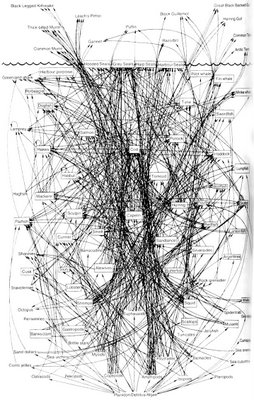Mental Models rule
Mental Models
We make thousands of decisions a day. Most of them unconsciously, a lot consciously. We use mental models to sort, classify our observations and to put them into perspective. Mental models are powerful, they make it possible to think, filter, decide and act on situations without evaluating every fact as a separate piece of information.
evaluating every fact as a separate piece of information.
The organisation chart
In most organisations that mental model is the organisation chart. It give as a nice picture, mental model, of how the organization works and how each part of the organisation relates to another. It shows distinct levels, clear separation between other parts and the relation between branches and levels. It's the mental model we act on. If asked "how are you organized ?" we all draw an organisation chart.
As said, mental models are powerful, we act on them. But what if it's wrong or oversimplified ? Does that have consequences ? Sure it has. Not all consequences are grave of course, but caution is well advised .
Not so long ago are mental model of mother earth was "the pancake", flat with edges. We know better now. Still for most daily activities that's not a problem. If I'm going out to the shop, I don't need the mental model "a blue ball hanging in the infinite universe", flat is fine. However if I become a bit more ambitious, like tanning and enjoying the sun during the European winter, it's very handy to know that you can fly around the world to a summer elsewhere.
Having the best mental model gives you an advantage, it opens up novel avenues, give rise to innovative ideas and the impossi ble suddenly seems possible.
ble suddenly seems possible.
The relation web
The mental model I use to look at organisations is "the relation web". People are the organisation. People communicate, work and act in the context of their relations. The organisation chart in only shows 0.000000001 % of the relations, or less.
Relations make an organisation tick. No relations, no communication, no action. The picture on the left is a model, simplified that is, of the Atlantic food web. It's about fishes, surely the relations of an organisation with people is even more complex.
Very few people have this model in their head when re-organising, executing projects or plan. All these activities take an immense effort, especially if you want them to go right. Take for example a simple message from the board dripping down through the organisation, more then half of the people don't get the message, it involves a lot of effort and it takes forever.
Compare this with the speed of a rumor or a good joke, it spreads like a virus, lighting fast and a lot of those exposed to it can recite it.
One morning I was driving in my car on my way to work, listen to the radio, there was a parodie on Frank de Boer, a Dutch soccer player, at that time playing for Barcelona. He has nasal voice, the joke evolved around the fact that he said "You've got e-mail" with his distinctive voice. Two hours later I'm om the phone with Korea talking to a Dutch colleague, in the background I constantly hear, Frank de Boer voice with "You've got e-mail". Somehow what was on the Dutch radio 2 hours before ended up in Korea attached to several e-mail clients and every time somebody got an e-mail, Frankie called out "You've got e-mail". Go figure.
Aren't organisations using the wrong mental model ? What do you think ?
‘The soul never thinks without a picture.’ — Aristotle

0 Comments:
Post a Comment
Subscribe to Post Comments [Atom]
<< Home